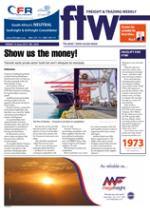South African
companies are
starting to move out
of their comfort zone
and join the scramble for the
rest of Africa – with many
recognising the opportunity
and potential of West Africa,
says trade consultant at
Whitehouse & Associates,
Duncan Bonnett.
“For many years a lot of
South African companies have
concentrated on the SADC
region and East Africa. And
while there is a greater level
of comfort in doing business
in southern and East Africa,
once that’s bedded down West
Africa is the logical next step.
Already we’re beginning to see
the likes of Shoprite expanding
on their stores in Nigeria, so
we will start to see growth.”
Nigeria is the centre of the
region with by far the largest
economy, says Bonnett. “And
despite the problems in the
north it’s on a good growth
trajectory.”
While many of the
opportunities still lie in the
oil and gas industry and
services around that, there are
increasing opportunities in the
fields of agro-industry, solid
minerals, telecommunications,
construction, retail, banking,
fast foods and franchising. “All
of these are starting to see a lot
more activity.”
And while a number of
South African companies are
moving into the market, there
are not enough, says Bonnett
– no more than around 100 in
his estimation.
“The popular perception
among South Africans is that
there’s nothing there other
than oil and gas – which is
selling Nigeria short. They
have a well-established
financial services centre
and a well-established
telecoms industry, and we’re
competing against Nigerian
manufacturers of industrial
products, food processing
and pharmaceuticals that are
sometimes three or four times
the size of SA manufacturers,
in the case of cement players
“And not only are we
competing against local
players, but also against
European, Asian and
Latin American countries.
Chinese companies are
setting up cell phone and
motorbike assembly
plants while some
of the big power
companies are setting
up manufacturing
units in
Nigeria. It’s a very dynamic
market offering opportunities
on a scale that we don’t see in
South Africa.”
The market is not, however,
without its challenges. “The
ports are better than they
used to be and it’s not a
cheap market – but if you can
overcome the challenges, it can
be very lucrative.”
Another key market in
the region, from an SA
perspective, is Ghana.
“For the past decade it’s
experienced a mining boom –
especially gold mining - which
has underpinned a lot of the
growth. But now there’s the
oil boom which is set to move
things to a new level. It’s been
under way for a year or two,
but we’re now starting to see
a move from exploration to
production and there’s a lot
more intensity in engagement
in infrastructure – not only
for mining but in housing and
retail development. As expats
and professionals move into
those areas down the coast,
there’s a large concentration
of relative wealth and demand
for goods and services.”
And while a lot of
development was previously
poorly planned - or unplanned
– this has now improved,
providing opportunities for
architects, quantity surveyors
and the like.
“Some South African
companies have been
involved from the start – from
architects who have designed
shopping malls to some of our
banks that have been active
in Ghana for a few years – but
there should be more South
Africans involved in the supply
of goods and services.”
While Nigeria and Ghana
are the big markets,
Bonnett believes a
number of other
West African
countries offer
significant
opportunities.
“Cote d’Ivoire,
as it tries to extricate
itself from problems of
instability, will bounce
back and is an important
economy in the region. From
an SA perspective it’s a market
that we haven’t explored much
at all.
“In Liberia, Sierra Leone
and Guinea there is a
developing iron ore complex
which is playing out quite
slowly. They have marooned
resources because they have
fantastic deposits of minerals
but no infrastructure to get
them to the coast. There’s a lot
of politics at play as they decide
where the rail and ports should
be, but while some mining
companies have walked away,
others are quite bullish.”
Mali is a no-go area for now,
but Senegal is a market to
consider – although from an
SA perspective it’s quite
far away and closer to Europe
and North Africa. “But it still
offers a lot of opportunity
in terms of downstream
agricultural processing. On
the negative side, it’s still quite
an unstable area in terms of
what’s happening in places
like Mali, north of Nigeria
and Niger, so you need to be
careful when you look at those
countries.”
Infrastructure issues,
says Bonnett, are not a lot
different from infrastructure
deficits in the rest of Africa.
There are plans to link coastal
highways through Ghana
to Cote d’Ivoire and the
creation of regional oil and gas
infrastructure is slowly coming
to fruition. “The West Africa
of 10 years ago is very different
in terms of infrastructure
development.
“Countries are slowly
getting their acts together and
we’re seeing improvements –
albeit off a low base.”
INSERT & CAPTION
Nigeria’s ports
are better
than they
used to be
but it’s not a
cheap market.
– Duncan Bonnett
Mali
A no go
area for
now.
Senegal
A lot of opportunity
in downstream
agricultural
processing.
NIGERIA
Despite the problems in the north
it’s on a good growth trajectory.
GHANA
Now there’s the
oil boom which
is set to move
things to a new
level.
Cote d’Ivoire
Will bounce
back and is
an important
economy in the
region.
Liberia
Guinea
Sierra Leone
There is a
developing
iron ore
complex.

